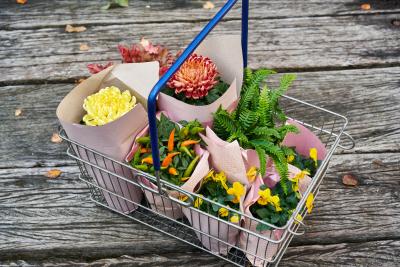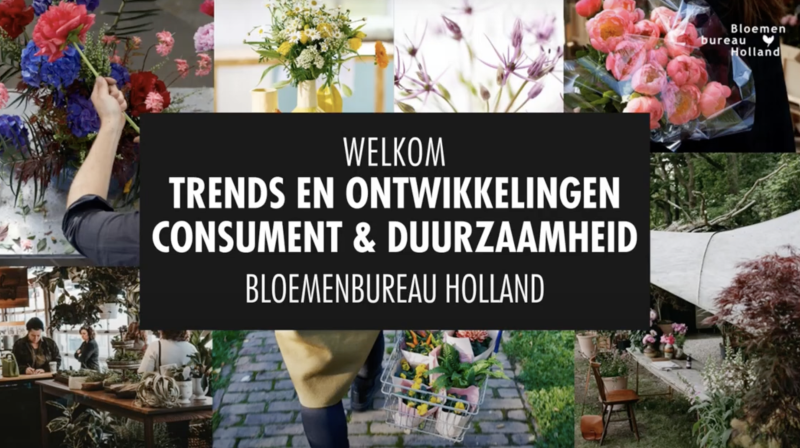Well-attended webinar on follow-up study of consumers and sustainability
On 19 March, the Flower Council of Holland organised a webinar about the results of the ongoing consumer research in the largest European markets. The research shows how the image of flowers and plants and the sector is developing in relation to sustainability. Over a hundred growers, traders and other interested parties took part in the webinar. They learned that the majority of consumers are neutral about the sustainability impact of flowers and plants. This is a group that we approach in our communications. After all, the ‘neutral’ group is receptive to positive steps towards greater sustainability.

Sustainability is without a doubt an increasingly important factor in the image consumers have of sectors and products. To monitor the development in sentiment, we have been carrying out a monthly analysis of perceptions since April 2023 in Germany, France, the United Kingdom and the Netherlands.
In a continuous online survey, market research agency Kantar sent questionnaires to nearly 10,000 respondents. A large group was first surveyed in April 2023. In the months that followed, groups of 600 respondents between the ages of 18 and 70 years were successively approached. The results are representative for each country.
The most important results
- Most consumers are either positive or neutral towards the horticultural sector when it comes to sustainability.
- Young people more positive than older consumers
- The Dutch are more neutral and critical about the flower sector
- Germans, French and English are cautiously more positive
- Plant sector ‘scores’ better than the flower sector
- Horticultural sector is still viewed as hesitant in its approach to sustainability
- Themes and expectations differ per country
- Younger consumers in particular are more aware of their own behaviour
- Socials are dominated by neutral news and relatively considerable negative sentiment
Largest group is neutral
The most important question in the survey: how do consumers view the sector when it comes to sustainability? Most consumers in the four countries do not have a strong opinion about the impact of the sector on sustainable development in the area. Since the zero measurement in April 2023, no major changes can be seen in this sentiment on average.
- The largest group is neutral: 53 percent for flowers and 52 percent for plants.
- A total of 42 and 45 percent of respondents are positive.
- Five percent and three percent of respondents are negative.
- Young people are relatively more positive than older consumers, who are often more neutral.
Consumers with a neutral perception are more susceptible to influence. Sustainable development in the horticultural sector, and the related communications, offer opportunities to positively influence sentiment in this group in particular.
Want to find out more, such about the differences between the countries? Read below.
- 1. Variable perceptions in the Netherlands
Both product categories show an exchange between the neutral and positive groups. When the neutral group becomes larger, the number of people with a positive perception shrinks and vice versa. Clear differences can be seen between the countries. Dutch consumers are least positive, although the neutral group is by far the largest one. Sentiment towards flowers in our country shows a variable development. The image of the plant sector is more stable, with fewer significant fluctuations. - 2. Positive perceptions on the rise
Since April 2023, German consumers have become slightly more positive on average towards the flower sector, while the image of the plant sector remains constant. French consumers are relatively most positive. The latter group is now larger than the ‘neutral’ group.
In the United Kingdom, there has been a positive upswing since April 2023 in consumer perceptions of both flowers and plants. For both product categories, the number of ‘positive’ consumers has been larger than ‘neutral’ consumers since November. - 3. Growing awareness among young people
The study shows that perceptions of the sector do not change quickly with regard to certain elements. The sector continues to be viewed as hesitant when it comes to sustainability. In the eyes of consumers, all parties in the chain should be accountable. There is growing awareness among the younger target group (ages 18-44) in particular that their own sustainable behaviour contributes to a positive impact.
Packaging plays an especially important role for Dutch consumers. In France, excessive water consumption is a more relevant theme, while German consumers expect more action to be taken in the use of pesticides. English consumers, on the other hand, feel strongly about flower and plant waste, peat and working conditions.
- 4. Attitude and behaviour
Sustainability intentions and the actual behaviour of consumers also often prove to differ widely. The most commonly stated barriers are insufficient knowledge of products, origins and environmental impact. The higher price is also often a decisive factor. Many respondents state that they do not consider sustainability when buying flowers, houseplants and outdoor plants. To them, the purchase should above all be enjoyable. - 5. Social mediaIn addition to the monthly measurement by Kantar, sentiment towards sustainability themes and the horticultural sector is now also tracked in a large number of social media channels. This ‘social media monitoring’ also shows trending topics over a longer period and provides more information on sources and critical consumers.
The initial results of social media monitoring in the Netherlands – monitoring has also started in the other countries – show that neutral news dominates, but that there is also negative sentiment. Most social posts and comments on flowers and plants in the past month have focused on pesticides. The online reach of posts on pesticides is twice as large on average as on other popular topics: greenhouses, emissions and energy.
Especially following reports in March on the high concentrations found in the water in the Noord Holland bulb-growing region, there has been considerable negative sentiment in social media.
Watch again?
Would you like to watch the webinar again? You can do so here.

Want to find out more?
For more information about this campaign, contact Anne van der Wal at avanderwal@bloemenbureauholland.nl.
